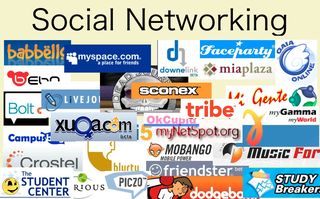I’ve been reading a lot about social networking lately—especially as it applies to recruiting. One of the business problems our company is constantly trying to solve is: How do you engage the highest quality candidates possible early in the recruiting process? Or more specifically: How do you entice candidates to engage in a dialog about their careers before they even start looking for a change?
 This is a tough nut to crack. In the last couple of years, there has naturally been more interest in social networks as a vehicle for accomplishing this task. Many career sites, including the major job boards, have attempted to leverage the internet traffic that social networking sites enjoy, for their own benefit. Their efforts have been met with a lot of frustration and poor results.
This is a tough nut to crack. In the last couple of years, there has naturally been more interest in social networks as a vehicle for accomplishing this task. Many career sites, including the major job boards, have attempted to leverage the internet traffic that social networking sites enjoy, for their own benefit. Their efforts have been met with a lot of frustration and poor results.
Recently, many of the discussions on this topic have migrated from espousing the great potential that social networks hold, to, “Does anyone have this figured out?” As this unfolds, I believe we’ll start uncovering some of the underlying principles that drive social networking and how it can be more effectively used for marketing and recruiting.
I wish I had a complete list of these principles to share with you at this point, but I’m not there yet. Like many other people who are trying to understand social networking, I’m starting to notice a few things and connect some dots, but the full picture has not emerged yet. This may take awhile!
Over the next couple of discussions, I’m going to share some of the things I’ve noticed in the process of discovery. If you’ve figured out some things in this arena, please share them via email or comments and we’ll learn together.
Earlier this week, Todd Raphael, editor of the Electronic Recruiting Exchange, posted an update from a recent forum on social networking and recruiting. The summary was titled, “A Community Few People Really Want.” Here are some thoughts that emerged from this discussion:
1. Social Network users are concerned about privacy when it comes to career issues.
When sharing things online, users are quick to share information about “where the party is,” or “what’s happening tonight,” but don’t want to share information that later can be scrutinized by potential employers, work colleagues, and other professionals. If we’re asking someone to share what they don’t like about their current job, don’t expect anyone with much intelligence to answer the question–this type of information has a way of getting to the wrong people.
2. Nothing kills a conversation like having “big brother” sponsor it.
“One conference-goer in the session said she created an online group for college-age students and interns to interact. Well, she tried. They didn’t take to it. ‘It’s been a one-way blast to them,’ she said. ‘They would not engage.’ She said many see each other in real life every couple of weeks at an event the company puts on, which involves a short educational session followed by networking. They also do community service projects together. But on the company intranet, they’re not chatty. And this is a problem because recruiters want them online so they can check them out and recruit them.”
3. Online social networking will not replace face-to-face networking.
Another forum contributor advised that “…if you don’t capture people in the medium you want, but you engage them in some other way, that’s plenty good. It’s about fostering community. If the face-to-face networking events work, do more of them. We spend a lot of time fighting what isn’t working, rather than doing what is working and saying, ‘let’s increase the volume of that, and chase those things.’”
Hopefully, this type of input will help you start to see where the major boundaries are with regard to social networking applications. These boundaries should help us define more clearly what doesn’t work. From there, we can focus on activities that have the best potential for reaching candidates. More to come in the next couple WorkPuzzles…
Editor’s Note: This article was written by Ben Hess. Ben is the Founding Partner and Managing Director of Tidemark, Inc. and a regular contributor to WorkPuzzle. Comments or questions are welcome. If you’re an email subscriber, reply to this WorkPuzzle email. If you read the blog directly from the web, you can click the “comments” link below.

